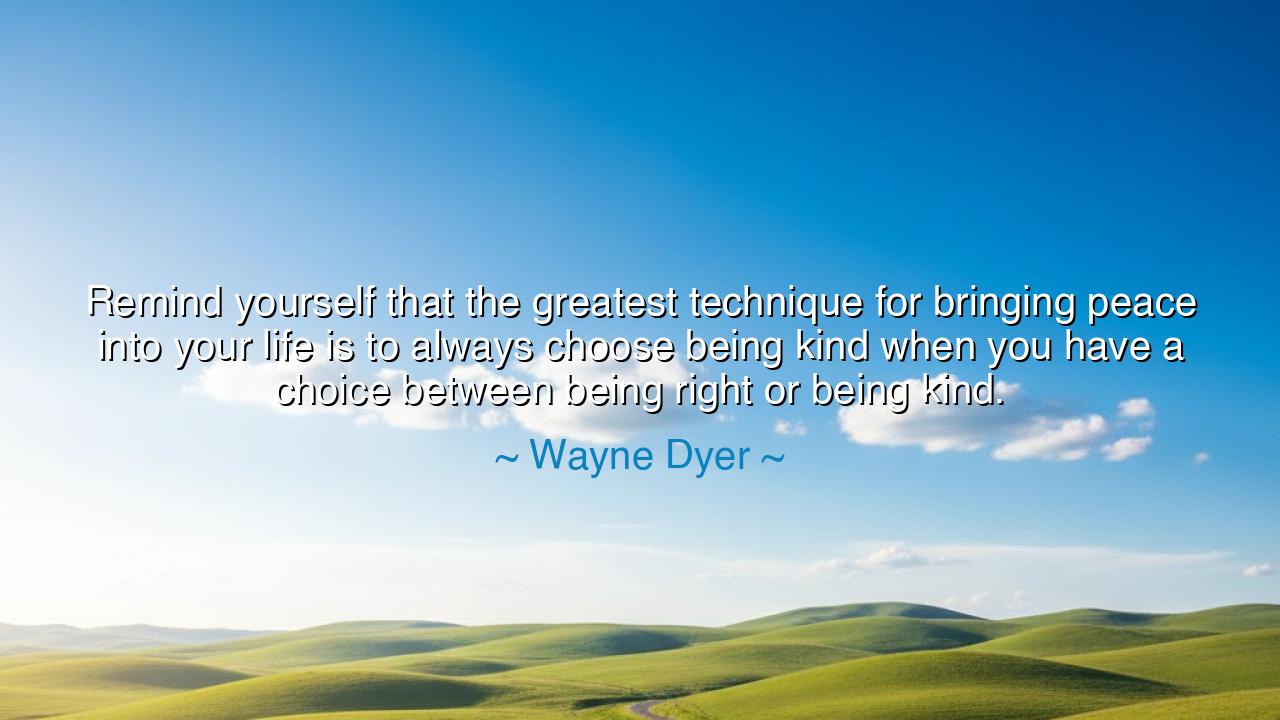
Remind yourself that the greatest technique for bringing peace
Remind yourself that the greatest technique for bringing peace into your life is to always choose being kind when you have a choice between being right or being kind.






Hear the gentle wisdom of Wayne Dyer, who taught: “Remind yourself that the greatest technique for bringing peace into your life is to always choose being kind when you have a choice between being right or being kind.” This saying pierces the heart with its simplicity, for it reminds us that life’s deepest harmony is not found in endless arguments or victories of the mind, but in the humble power of compassion. To insist on being right may feed pride, but to choose kindness feeds the soul—both yours and the soul of the one before you.
For what is peace, if not the quiet of the heart? Many believe it is won by conquest, by proving others wrong, by standing as the victor in every dispute. Yet such victories are hollow, for they leave behind bitterness, resentment, and division. To choose kindness is to surrender the fleeting triumph of pride for the eternal strength of love. It is to recognize that the bond between souls is greater than the outcome of a quarrel, and that sometimes silence and gentleness heal more than a hundred sharp words ever could.
History bears witness to this truth. Consider the story of Abraham Lincoln, who during the Civil War was criticized mercilessly by political enemies. When asked why he did not respond with vengeance, he replied, “Do I not destroy my enemies when I make them my friends?” Lincoln chose kindness over the harsh need to prove himself right, and in doing so, he created unity where hatred might have endured. His strength lay not in domination, but in compassion that reached even to those who opposed him.
The teaching of Dyer is also a warning against the tyranny of ego. The desire to always be right springs from pride, from the need to elevate oneself above another. Yet what is gained when we prove ourselves correct but lose a friend, a spouse, or a child? What is won when the truth of our words comes at the cost of love? The wise know that to preserve connection is greater than to preserve pride. The choice of kindness is not weakness—it is the highest form of strength, for it requires mastery of the self.
Even the sages of old echoed this. The Buddha spoke of winning hatred not by hatred, but by love alone. Jesus of Nazareth counseled his followers to turn the other cheek, not to prove weakness, but to break the chain of anger through mercy. The Stoics, too, taught that the only true victory is victory over one’s passions. To choose kindness when one could choose rightness is to walk the path of these ancient teachers, turning away from strife toward a deeper harmony.
O children of tomorrow, take this lesson into your lives. When you stand at the crossroads of conflict, ask yourself: will being right bring peace, or will being kind bring healing? Practice this not only with strangers, but most of all with those nearest to you, for it is often in the smallest disagreements that the greatest wounds are made. Guard your words, soften your tone, and remember that each encounter is a chance either to divide or to unite.
Thus the words of Wayne Dyer shine like a lamp in the darkness: the path to peace is not paved with victories of the mind, but with victories of the heart. The world needs fewer conquerors of arguments and more conquerors of hatred. Choose kindness when faced with the choice of being right, and you will find yourself walking not only in peace with others, but in deep peace within yourself. For kindness is the true crown of wisdom, and the legacy that endures beyond all words.






VTVinh Tieu
I love how Wayne Dyer highlights the power of kindness in creating peace. It’s often easier to assert our rightness, but the long-term effects of that are usually damaging to relationships. But is it always clear when we should choose kindness over being right? Sometimes, the ‘right’ choice feels like it can’t be ignored, especially when dealing with issues that have real consequences. How do we know when to prioritize kindness over being right?
AAqfggcxvv
Wayne Dyer’s perspective on kindness versus being right is a bit of a wake-up call. It’s so easy to get caught up in the need to be right, especially when emotions are involved. But I’ve found that choosing kindness often leads to more productive conversations. That said, what happens when kindness is misunderstood? Can being kind sometimes mean sacrificing your values, or is it just a way to handle things more gracefully?
Hhterhjnb
This quote really resonates with me, especially in a world where everyone seems to be fighting to prove they’re right. I’ve realized that sometimes, being right isn’t as fulfilling as it seems, especially when it comes at the cost of hurting someone else. But can we always choose kindness? In some situations, standing up for what’s right seems necessary. How do we balance kindness with standing firm on important issues?
Ssfgsetgseg
Wayne Dyer’s quote speaks to the importance of choosing kindness, even when we feel justified in being right. I often struggle with this—there are times when being right feels like the only thing that matters, especially in arguments or heated discussions. But does being 'right' always bring peace, or does it just create more conflict? I wonder how much smoother our relationships would be if we chose kindness more often, even when we’re 'right.'